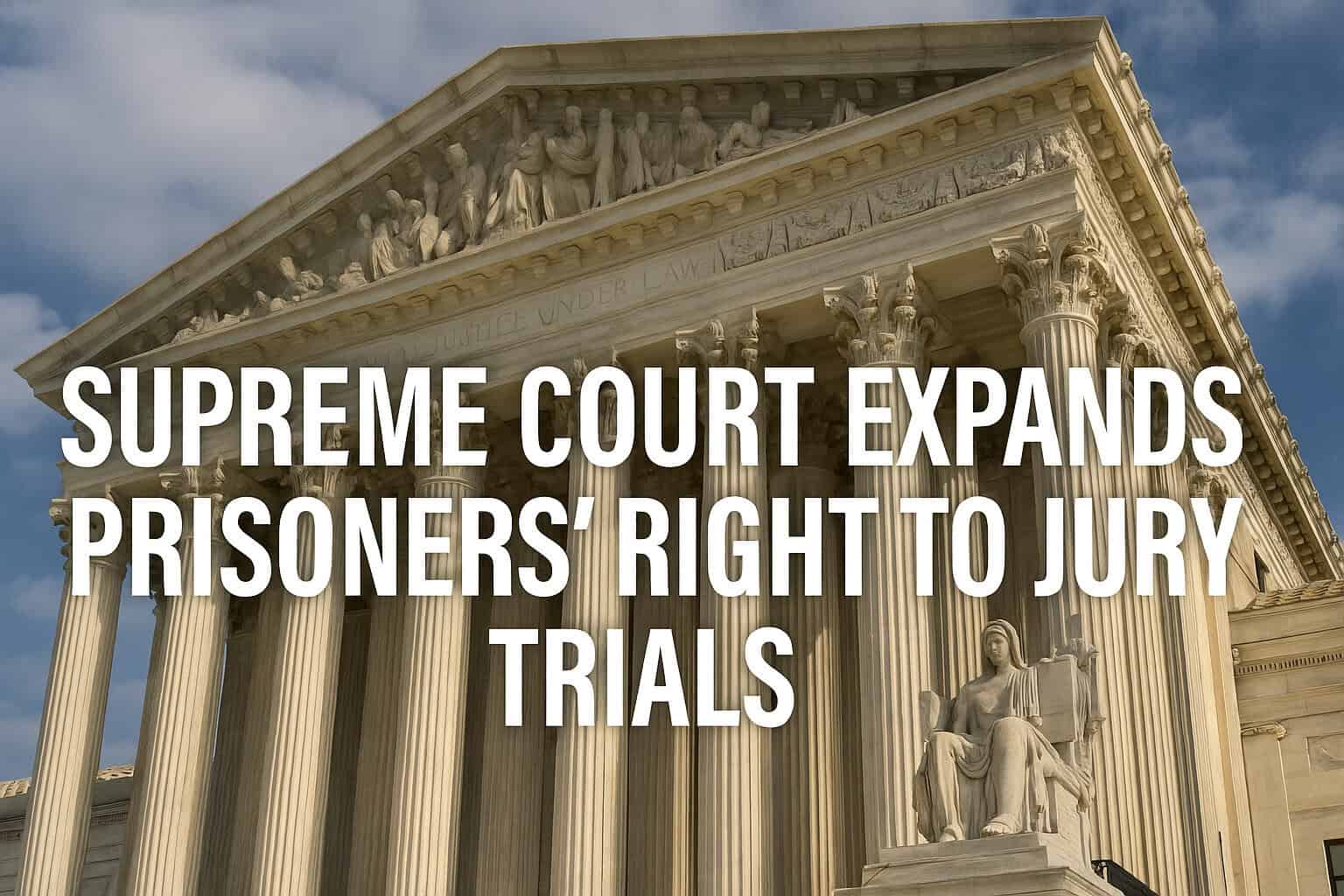In a landmark 5–4 decision on Wednesday, the U.S. Supreme Court ruled that incarcerated people may, in some cases, be entitled to a jury trial under the Seventh Amendment—even when their lawsuits arise under the restrictive Prison Litigation Reform Act (PLRA). The decision marks a major victory for prisoner rights and affirms a basic legal truth: prison walls do not erase constitutional protections.
The case, brought by a man incarcerated in Michigan, centered on deeply disturbing allegations. The plaintiff claimed he was sexually assaulted by a prison official, and when he tried to file a formal grievance under the PLRA, he was retaliated against and actively prevented from doing so. Under the PLRA, prisoners are generally required to exhaust all administrative remedies (such as filing grievances) before they can file lawsuits. But the Court found that if prison officials deliberately obstruct that process, prisoners should not be penalized for failing to complete it—and may be entitled to have their claims heard by a jury.
Why This Matters
The ruling is more than a procedural clarification—it’s a recognition of the realities that prisoners face when seeking justice from inside a system designed to silence them. The PLRA was originally passed in the 1990s to curb what lawmakers then called a flood of “frivolous” inmate lawsuits. In practice, it has become a tool for burying legitimate claims of abuse, medical neglect, sexual assault, and retaliation.
Until now, many prisoners were locked out of court simply because they couldn’t navigate a grievance process that is often intentionally obstructed. Forms are denied. Deadlines are manipulated. Officers retaliate. As a result, countless serious abuses never make it to a courtroom.
This ruling changes that—at least in cases where prisoners can show they were blocked from filing grievances.
Jury Trials: A Constitutional Right, Even in Prison
The Seventh Amendment guarantees the right to a trial by jury in civil cases. But for prisoners, that right has long been suppressed by a bureaucratic maze of grievance requirements. With this ruling, the Court affirmed that incarcerated people still have the right to have their claims heard by a jury of their peers—especially when factual disputes involve serious misconduct by prison staff.
For prisoners in Georgia, where the grievance system is notoriously broken and retaliation is rampant, this could be a turning point.
“In Georgia, a grievance is not confidential and retaliation is assured. Officers aligned with gangs often have someone ‘touch up’ the person who filed it. That’s what some of those deaths are about—even if no one knows why the hit was ordered,” one GPS contributor explained earlier this year.
What It Means for Georgia
This decision will empower more prisoners in Georgia and across the South to pursue justice in federal court, even when their path through the PLRA grievance system has been obstructed. It directly challenges a common defense used by the Georgia Department of Corrections (GDC): dismissing lawsuits on procedural grounds before the facts are ever heard.
It also reaffirms something the GDC often forgets: constitutional rights do not end at the prison gate.
The DOJ has documented cases where inmates reported sexual assault, physical abuse, or medical neglect—only to have their grievances ignored, lost, or used as grounds for punishment. In some dorms, officers refuse to provide grievance forms altogether. This decision could finally provide a legal remedy for those trapped in a system that routinely denies them access to due process.
What Needs to Happen Now
1. Legal Aid Expansion: Prisoners need better access to legal resources, especially those who have been silenced or retaliated against.
2. Independent Oversight: Georgia needs to create an independent grievance review board with the power to investigate obstruction and retaliation.
3. Court Access Education: Inmates should be informed of their rights under this ruling—and how to document obstruction when it occurs.
4. Legislative Action: Georgia lawmakers should move to align state law with the Supreme Court’s decision by clarifying exceptions to grievance exhaustion when retaliation or obstruction is involved.
A Step Toward Accountability
This is not a cure-all. The PLRA still stands. Many hurdles remain. But for the first time in decades, the U.S. Supreme Court has opened a narrow door for justice that had been slammed shut on countless prisoners.
Read more GPS articles that touch on grievances:
No Way Out: How Georgia’s Broken Grievance System Silences Prisoners and Shields Abuse
• Filing a grievance isn’t a path to justice—it’s a target on your back. Retaliation is common, forms go missing, and prisoners are punished just for trying to speak up. This isn’t a broken system—it’s a silencing machine. And it’s costing lives.
• Proposes reforms that imply a lack of inmate protections, including grievance reform and oversight. Focus is on systemic solutions.
In and Out: The Lives Destroyed by the GDC
• Explores how the cycle of incarceration is fueled by neglect, abuse, and inaction—including a prison culture where formal complaints are ignored or punished.
From Kangaroo Courts to Chaos: Georgia’s Prison Crisis
• Discusses the abuse of the disciplinary report (DR) system, which often runs parallel to the grievance system and can retaliate against those who complain or try to speak out.


1 thought on “A Win for Justice: Supreme Court Expands Jury Trial Rights for Prisoners Blocked from Filing Grievances”